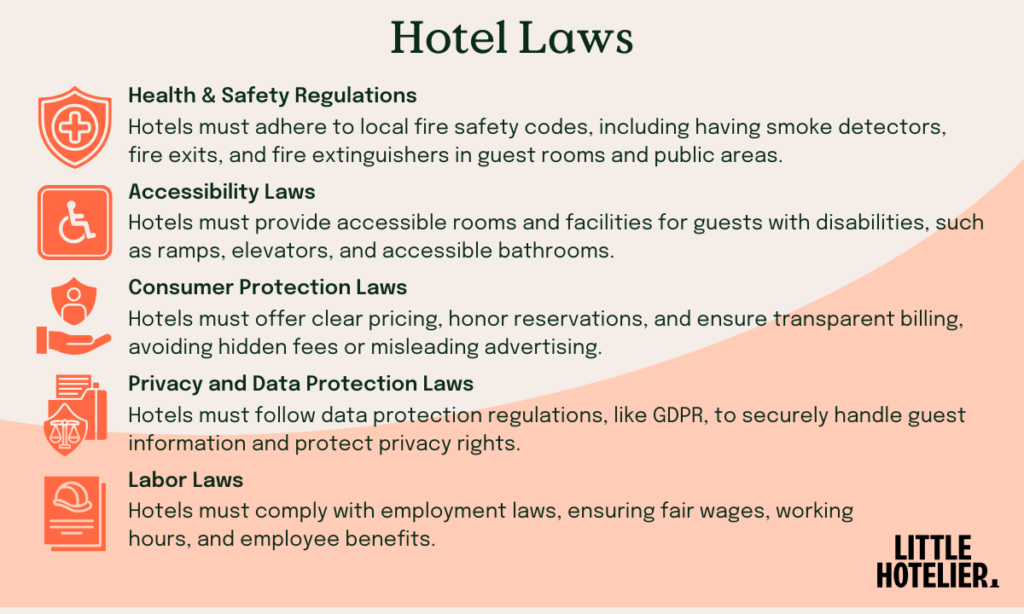What are hotel laws and regulations?
Hotel laws and regulations are legal requirements that must be followed by hoteliers to ensure guest safety, protect business operations and comply with all relevant standards.
This task is made more complex by the fact that in the US hotel laws can vary significantly state by state, and even region by region.
In this guide we’ll take a closer look at US hotel laws and regulations, to understand exactly what rules you need to abide by as a hotelier managing your own property.
Gain visibility and control over hotel operations
Little Hotelier’s all-in-one software helps to ensure your hotel abides by every relevant rule and regulation, giving a small, independent hotelier total control
Learn moreWhy it’s important to understand hotel laws
It’s critical that you tick every regulatory box as a small, independent hotelier, as the consequences of failing to do so can be huge, from fines to the forced closure of your business. Legal compliance simply isn’t optional.
The rules are also there for a reason: for guest safety and privacy, to fight fraud and nefarious practices, and to maintain a level playing field.
Compliance with hotel laws is your defence against fines, shutdowns and bad guest experiences. It forms the foundation of success for your hotel business – the first job on your list, which lays the groundwork for everything else.

Hotel laws in different states
The US is a sprawling country that hands plenty of law making power to state and local governments. As such, hotel rules and regulations can change quite a bit when you cross a domestic border.
Let’s take a look at how three of the largest states in the US differ in terms of hotel laws.
Hotel laws and regulations Florida
Florida hotel laws place strong emphasis on public health and safety. Hotels must comply with sanitation standards set by the Department of Business and Professional Regulation (DBPR), including regular inspections of water quality, food services and pest control (particularly important in such a hot and humid state).
Florida also has strict rules around disaster preparedness, especially for hurricane-prone areas. Accessibility, fire safety and clear guest pricing are all closely monitored, and hotels must display their lodging license publicly on the property.
California hotel laws
California hotel regulations are amongst the strictest in the US, especially when it comes to employee rights and sustainability. Hotels must comply with state labour laws like daily housekeeping rules, fair scheduling and even human trafficking awareness training.
Environmental compliance is also key – many cities require hotels to undertake recycling, energy efficiency and water conservation programs. Hotels must clearly disclose resort fees and can face heavy fines for misleading pricing or advertising. Local ordinances can add additional layers of regulation.
Texas hotel laws
Texas hotel laws prioritise property rights, public safety and consumer transparency. Hotels are subject to fire code compliance, health inspections and zoning regulations governed by local jurisdictions. The state also enforces laws on room tax collection and clear display of rates.
In terms of hotel eviction laws, Texas hotels can typically evict guests without formal legal proceedings, but if a guest has established residency – whether through an extended stay or by receiving mail at the hotel – they could be considered a tenant, which would necessitate more formal eviction procedures.
Note that the examples above are very broad: it’s critical that you carefully check all the specific laws that apply in your location.
Hotel laws and regulations small hotels need to know
What sort of laws should a small, independent hotelier be aware of? Examples include:
Hotel refund laws
While some states have mandatory refund rules for specific situations, your stated cancellation policy will generally take precedence. As such you should clearly state your refund terms in booking confirmations, and always provide refunds for major service failures.
Example: In California, guests can claim refunds under specific California hotel laws if room conditions are unsafe.
Licensing and zoning compliance
At bare minimum, to set up a hotel you’ll generally need to register your hotel business, gain zoning approval for commercial accommodation, and display your proper licenses. These rules can be created and enforced at a very local level, so check your responsibilities with the relevant authorities.
Example: In Florida, hotels are fined for operating without a commercial zoning variance.
Health & safety laws
Check your responsibilities in terms of fire safety (extinguishers, exits, meeting points), cleanliness and sanitation, water quality and food safety, and accessibility requirements.
Example: Most hotels in New York City are legally required to be wheelchair accessible.
Hotel room temperature regulations
Certain US states have regulations relating to hotel room temperatures, that focus on both energy efficiency and guest comfort and safety.
Example: California’s Title 24 energy code requires hotels to have in-room thermostats that offer both Fahrenheit and Celsius readings. Unoccupied rooms can’t be heated lower than 60°F or cooled higher than 80°F.
Hotel privacy laws
With data privacy becoming an increasingly prevalent issue across the globe, your hotel should collect only necessary information, and secure it properly. No matter where you operate, it’s wise to comply with world-leading privacy laws like Europe’s GDPR.
Example: California hotels must comply with the California Privacy Rights Act (CPRA).
Hotel security camera laws
Speaking of privacy, hotels can only place cameras in common/public areas – no surveillance can be carried out in private spaces (e.g. rooms and bathrooms).
Example: In Texas property owners must post signage that indicates the presence of security cameras, including the name and contact information of the entity responsible for those cameras.
Hotel regulations
Hotels must meet a range of operational standards, including routine health inspections and proper pest control practices. These extend to food and drink safety for any on-site restaurants and bars.
Example: In Florida, hotels are required to undergo regular inspections by the Department of Business and Professional Regulation, who check cleanliness, sanitation and vermin control.
Common hotel rules and regulations to include in your policies
The line between general hotel rules and firm regulations can sometimes be fuzzy. But for the most part, as long as you take relevant laws into account and clearly state your hotel rules, you can guarantee the safety of guests and the satisfaction of authorities. Examples include:
- Quiet hours: Set specific times (e.g. 10pm–7am).
- Check-in/out times: Clearly state check-in and check-out windows.
- No-smoking policy: Define smoke-free areas and clearly outline any cleaning/penalty fees.
- Pet policy: Specify whether pets are allowed, and any restrictions, exceptions and penalties.
- Visitor policy: Set guidelines around non-guests entering the property.
- Damage and liability clause: Outline responsibility for property damages.
- Emergency procedures: Provide evacuation routes and safety instructions in your rooms.
All rules should be specific, clearly displayed, and align with local laws. One way to better manage the legal and regulatory responsibilities of your property is with technology.
Case in point: Little Hotelier.
By Mark Dawson
Table of contents
“My initial impression is that the new layout and calendar views are fantastic. It's still a work in progress, but things are going well so far.”
Owner, Chalet Guesthouse and Studio









Jen Llewellyn,
Owner
Country Dome Suites